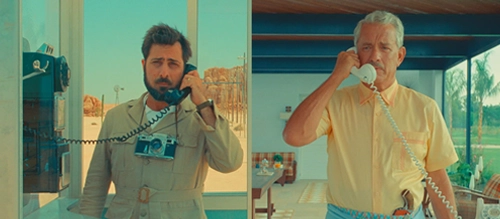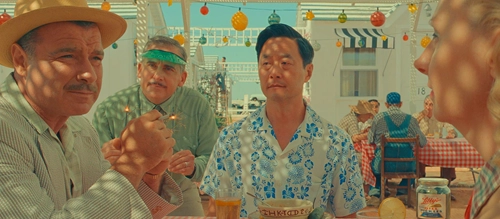Asteroid City (2023) Review

Asteroid City (2023)
Director: Wes Anderson
Screenwriter: Wes Anderson
Starring: Jason Schwartzman, Scarlett Johansson, Tom Hanks, Jeffrey Wright, Tilda Swinton, Bryan Cranston, Edward Norton, Adrien Brody, Rupert Friend, Maya Hawk, Jake Ryan, Liev Schreiber, Hope Davis, Stephen Park
Wes Anderson has one of the most recognizable styles of any filmmaker working today. Many hallmarks of his work, such as symmetrical composition, the use of pop music from the 1960s and 70s, and quirky characters, are all easily identifiable, leading to countless parodies and homages. Most recently, creators on TikTok have taken to shooting and editing videos in such a way as to imitate his style, with one user going so far as to say that it was easy to do because, “Turns out, it just wasn’t that hard,” implying that Wes Anderson is not that special, actually.
Setting aside the obvious, which is that 2 minute TikToks are not, in fact, movies, this observation, coupled with the decidedly more horrifying Twitter trend of using AI technology to create soulless and uncanny still photos in order to answer questions no one asked, like “what if Wes Anderson made a Star Wars movie”, misses the point. It’s not just what his films look like that makes him such a singular creative voice, it’s how those films make us feel.
If there was any defense for Anderson’s work, it is certainly his latest effort, Asteroid City, which may be his most poignant movie to date. “Asteroid City” is a play written by Conrad Earp (Edward Norton), and the movie goes back and forth between relaying the technicolor events of the play and showing the black-and-white television production of it, as well as several dramatic re-enactments of the play’s creation.
“Asteroid City” takes place in the fictional desert town of the same name, whose only claim to fame is being the site of a meteoroid crash. Augie Steenbeck (Jason Schwartzman) arrives in town with his teenage son, Woodrow (Jake Ryan), and his three young daughters, along with several others, for the Junior Stargazers convention. But, when Augie’s car breaks down and a UFO sighting causes the entire town to go into quarantine, he is forced to face some difficult truths about life after losing his wife to a long illness.
Anderson continues to do what he does best, rarely straying from his usual path. In that way, Asteroid City is perhaps exactly what you’d expect from him, without much room for surprise or experimentation. Anderson’s usual quirks are all present and, if you are a fan of his work, Asteroid City will be a feast for your eyeballs. His incredible use of color alone is like a shot of dopamine. There is something so pleasing about how meticulous and symmetrical his framing is. Anderson’s visual style speaks to that primal part of human nature that desperately craves order among chaos. However, if his films haven’t been your cup of tea in the past, this one will probably not make you a convert.

The large ensemble cast is pitch-perfect. Everyone is memorable and makes an impression, especially Adrien Brody and Steve Carell, who make the most of their limited screen time. Jason Schwartzman gives a career-best performance. His subtlety and expert control over his physicality, not to mention the depth of feeling hiding behind his eyes, make it seem like he isn’t doing much at first until he suddenly turns you into a sobbing mess towards the end of the film. Scarlett Johansson is also a standout, commanding the screen in a way few contemporary actors can manage. It makes you sigh with relief that her Marvel days are behind her.
Asteroid City is also hilarious and it makes its moments of emotional levity hit that much harder. Underneath all of that style and organization is a deep sense of melancholy, the realization that life is random and impossible to control. The movie is a fascinating post-pandemic movie, as it deals with the feelings of isolation and reflection that have become all too common over the last couple of years.
Though Anderson has used framing devices many times in the past as a sort of meta-commentary on the very nature of storytelling, it’s probably the most effective it has ever been in Asteroid City. There is a moment when the actor playing Augie steps out of the play and runs backstage to find the director because he still doesn’t understand the point of the play. It’s like a dam bursts and all of Augie’s pent-up grief comes rushing out. There are so many questions, not just about the story being told, but about life in general. What’s the point of grief? What’s the point of stories? What’s the point of anything?
“It doesn’t matter,” Green tells him. “Just keep telling the story.”
In a world recently ravaged by a deadly pandemic that upended so many lives, it’s almost a comfort to be told that life rarely makes any kind of sense. Grief is not something that can be solved. It must be lived and felt, day by day, until finally it doesn’t hurt as much anymore.
Score: 23/24
Recommended for you: Wes Anderson Films Ranked

